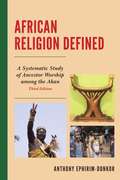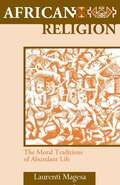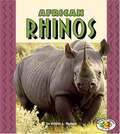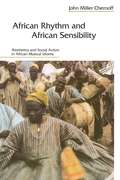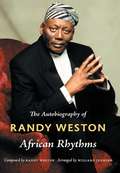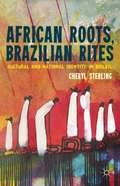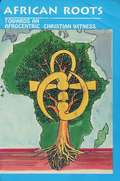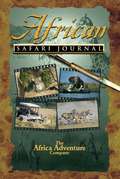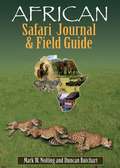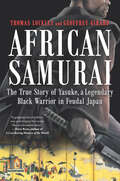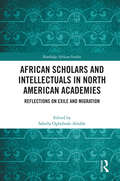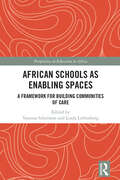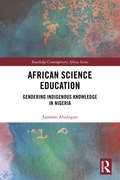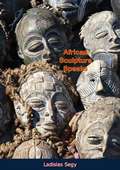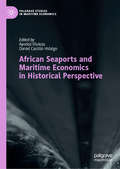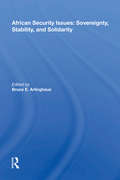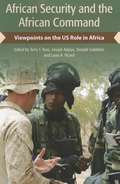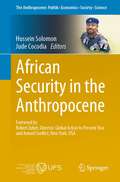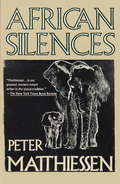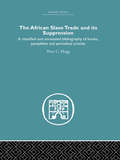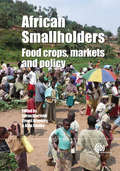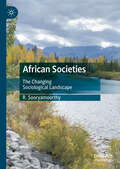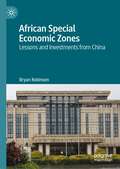- Table View
- List View
African Religion Defined: A Systematic Study of Ancestor Worship Among the Akan (3rd Edition)
by Anthony Ephirim-DonkorThis edition updates the scholarship on ancestor worship--with the addition of three new chapters. Beginning with Akan theology and ending with sacrifices, the study examines Akan conception of God, the abosom (gods and goddesses) relative to creation, centrality of the ancestors' stool as the ultimate religious symbol housing the soul of the Akan, and organized annual propitiatory festivities carried out among the Akan in honor of the ancestors (Nananom Nsamanfo) and abosom. The book, therefore, serves as an invaluable resource for those interested in the phenomenon of African religion, because it provides real insight into ancestor worship in ways that are meaningful, practical, systematic, and as a way of life by an Akan Traditional ruler (Ↄdikro) and a professor of Africana studies.
African Religion: The Moral Traditions of Abundant Life
by Laurenti MagesaDescribes the moral teachings (values, norms and principles to follow so that life might be abundant for all) of the African religion as it relates to individuals and community.
African Religions and Philosophy
by John S. MbitiDiscusses the philosophies, rituals, and ceremonies of various African religions and their influence in the lives of the people.
African Rhinos
by Kristin L. NelsonDo you know . . . * how much a rhino weighs? * what rhinos eat? * why rhinos charge? Read this book to find out!
African Rhythm and African Sensibility: Aesthetics and Social Action in African Musical Idioms
by John M. Chernoff"We have in this book a Rosetta stone for mediating, or translating, African musical behavior and aesthetics." --Andrew Tracey, African Music. "John Miller Chernoff, who spent 10 years studying African drumming, has a flair for descriptive writing, and his first-person narratives should be easily understood by any reader, while ringing unmistakably true for the reader who has also been to West Africa." --Roderick Knight, Washington Post Book World. "Ethnomusicologists must be proud that their discipline has produced a book that will, beyond doubt, rank as a classic of African studies." --Peter Fryer,Research in Literatures. "A marvelous book. ... Not many scholars will ever be able to achieve the kind of synthesis of 'doing' and 'writing about' their subject matter that Chernoff has achieved, but he has given us an excellent illustration of what is possible." --Chet Creider, Culture. "Chernoff develops a brilliant and penetrating musicological essay that is, at the same time, an intensely personal and even touching account of musical and cultural discovery that anyone with an interest in Africa can and should read. ... No other writing comes close to approaching Chernoff's ability to convey a feeling of how African music 'works'." --James Koetting, Africana Journal. "Four stars. One of the few books I know of that talks of the political, social, and spiritual meanings of music. I was moved. It was so nice I read it twice." --David Byrne of "Talking Heads". The companion cassette tape has 44 examples of the music discussed in the book. It consists of field recordings illustrating cross-rhythms, multiple meters, call and response forms, etc.
African Rhythms: The Autobiography of Randy Weston
by Randy WestonThe pianist, composer, and bandleader Randy Weston is one of the world's most influential jazz musicians and a remarkable storyteller whose career has spanned five continents and more than six decades. Packed with fascinating anecdotes, African Rhythms is Weston's life story, as told by him to the music journalist Willard Jenkins. It encompasses Weston's childhood in Brooklyn's Bedford-Stuyvesant neighborhood--where his parents and other members of their generation imbued him with pride in his African heritage--and his introduction to jazz and early years as a musician in the artistic ferment of mid-twentieth-century New York. His music has taken him around the world: he has performed in eighteen African countries, in Buddhist temples and Shinto shrines, in the Canterbury Cathedral, and at the grand opening of the Bibliotheca Alexandrina: The New Library of Alexandria. Africa is at the core of Weston's music and spirituality. He has traversed the continent on a continuous quest to learn about its musical traditions, produced its first major jazz festival, and lived for years in Morocco, where he opened a popular jazz club, the African Rhythms Club, in Tangier. Weston's narrative is replete with tales of the people he has met and befriended, and with whom he has worked. He describes his unique partnerships with Langston Hughes, the musician and arranger Melba Liston, and the jazz scholar Marshall Stearns, as well as his friendships and collaborations with Duke Ellington, Dizzy Gillespie, Coleman Hawkins, Thelonious Monk, Billy Strayhorn, Max Roach, Charlie Parker, Miles Davis, the novelist Paul Bowles, the Cuban percussionist Candido Camero, the Ghanaian jazz artist Kofi Ghanaba, the Gnawa musicians of Morocco, and many others. With African Rhythms, an international jazz virtuoso continues to create cultural history.
African Roots, Brazilian Rites
by Cheryl SterlingThis text explores how Afro-Brazilians define their Africanness through Candomblé and Quilombo models, and construct paradigms of blackness with influences from US-based perspectives, through the vectors of public rituals, carnival, drama, poetry, and hip hop.
African Roots: Towards an Afrocentric Christian Witness
by John H. Adams Michael I. Dash L. Rita Dixon Darius L. Swann Ndugu T'Ofori-Atta Zachariah Anderson Rita DixonThis resource will expand our database about our African heritage, help us see the role and contributions of Africa in world culture, motivate us to re-examine some long held stereotypes about African peoples, and move us into the future with a strong pride and hope for the descendants of Africa and the human family. May we forever remember that when one part of the human' family has been dehumanized, the whole family is distorted. Our loving parent, God, is just and faithful, generously giving every branch of the human family good gifts to be used for the liberation and peace of all. In a real sense, this book is about--Identity, the loss of it, the search for it,, the denial of it, the recovery of it. It tells about efforts to appreciate and to affirm identity for a particular ethnic group of this world's peoples. This book is addressed especially to those who are predisposed to engage in this quest for identity and a proper affirmation of it. The curious may be sufficiently interested to contest or challenge those engaged in this search for roots. It is hoped that others who are' indifferent or apathetic may- be aroused by the efforts of the first two groups. So inescapably this is a book for you. This resource seeks to help Christians in general, and African American' Christians in particular, to become more aware of Africa in antiquity, her enormous contributions to other cultures and the depths of the African genius in religion and world culture. It is hoped that each lesson will motivate participants to read more, go deeper than what is offered in this resource. The bibliography is provided as a guide for doing this. In order for African American people to have a healthy and balanced self-love, it is necessary to identify the distortions, to learn a more accurate version of our history, to understand that the experiences in our journey with God are deep, and to teach others, especially our children, so that all of humanity may be transformed by the African presence and contribution to the world. This study resource may be used by individuals or groups. The following groups provide excellent settings: *Family groups *Sunday School Classes *Week-day or night church classes *Retreat settings *Adult Continuing Education Classes *Personal enrichment classes
African Safari Journal
by Duncan Butchart Mark W. NoltingGoing on safari requires preparation - and no book leaves a traveler better prepared than this one. Including a wildlife guide and checklist, trip organizer, phrase book, safari diary, and map, this tremendous resource puts all necessary information right at the traveler's fingertips.
African Safari Journal and Field Guide
by Duncan Butchart Mark W. NoltingThe African Safari Journal & Field Guide is the perfect book to take on safari because it is a wildlife guide, trip organizer, phrase book, safari diary, map directory and wildlife checklist, all in one! And because many safariers have strict baggage limits, this 7-BOOKS-IN-ONE journal becomes even more valuable because it features all the information a traveler to Africa is going to need. It puts key safari information at the reader's fingertips and allows them to record unforgettable memories of their African adventure.The African Safari Journal & Field guide includes the following valuable features that help to make the reader an instant authority while on safari:* Over 500 COLOR illustrations and detailed descriptions of mammals, reptiles, birds, insects and trees for easy identification.* Illustrations of Africa's vegitation zones* The most comprehensive checklists of mammals and birds for recording sightings in reserves* Over 60 COLOR maps that detail regions, countries and major wildlife reserves* Swahili, Tswana, Shona, Zulu and French words, phrases and mammal names (with phonetics)* Constellation maps of the Southern Hemisphere -- and a stargazers guide* Safari tips* Photography on safari* Glossary of safari terms* Packing checklist* Contact information for US and Canadian Embassies and British High Commissons in Africa* World Heritage sites* Resource directory*Suggested reading list* 30 journal pages to record their personal safari experiencesThe African Safari Journal & Field Guide can be personalized with the following:* Journal author information* Medical information* Packing checklist and luggage inventory* Travel and health insurance* Journal log and daily entries* Mammal and bird check lists* Sections to record flight and safari itineraries
African Samurai: The True Story of Yasuke, a Legendary Black Warrior in Feudal Japan
by Geoffrey Girard Thomas LockleyThis biography of the first foreign-born samurai and his journey from Africa to Japan is “a readable, compassionate account of an extraordinary life” (The Washington Post).When Yasuke arrived in Japan in the late 1500s, he had already traveled much of the known world. Kidnapped as a child, he had ended up a servant and bodyguard to the head of the Jesuits in Asia, with whom he traversed India and China learning multiple languages as he went. His arrival in Kyoto, however, literally caused a riot. Most Japanese people had never seen an African man before, and many of them saw him as the embodiment of the black-skinned Buddha. Among those who were drawn to his presence was Lord Nobunaga, head of the most powerful clan in Japan, who made Yasuke a samurai in his court. Soon, he was learning the traditions of Japan’s martial arts and ascending the upper echelons of Japanese society.In the four hundred years since, Yasuke has been known in Japan largely as a legendary, perhaps mythical figure. Now African Samurai presents the never-before-told biography of this unique figure of the sixteenth century, one whose travels between countries and cultures offers a new perspective on race in world history and a vivid portrait of life in medieval Japan.“Fast-paced, action-packed writing. . . . A new and important biography and an incredibly moving study of medieval Japan and solid perspective on its unification. Highly recommended.” —Library Journal (starred review)“Eminently readable. . . . a worthwhile and entertaining work.” —Publishers Weekly“A unique story of a unique man, and yet someone with whom we can all identify.” —Jack Weatherford, New York Times–bestselling author of Genghis Khan
African Scholars and Intellectuals in North American Academies: Reflections on Exile and Migration (Routledge African Studies)
by Sabella Ogbobode AbiddeThis book examines the process and events surrounding the migration of African scholars, as well as their lives and lived experiences within and outside of their colleges and universities. The chapters chronicle the lived-experiences and observations of African scholars in North America and examine a range of issues, ideas, and phenomena within North American colleges and universities. The contributors examine the political, ethnic, or religious upheavals that informed their migration or banishment; contrast the teaching-learning-research environment in Africa and North America; and discuss on and off-campus experience with segregation and racial inequality. This book will be of interest to students and scholars of the African Diaspora, migration, and African Studies.
African Schools as Enabling Spaces: A Framework for Building Communities of Care (Perspectives on Education in Africa)
by Linda Liebenberg Vanessa SchermanUsing African schools as case studies, this book presents an implementation framework that can be used by schools internationally to drive social change and support their role as enabling spaces, allowing learners to thrive. Recognising the increase in demands, violent conflicts, lack of stability, and social strain prevalent within the current African school system, this book covers the challenges that negatively impact children's development by understanding and presenting a framework that ensures a holistic social and educational support system can be created for students. Featuring contributions from a broad range of leading scholars, the book ultimately addresses the critical need in academic and practice research for the importance of schools in building civil societies. Arguing for the importance of schools as places of stability, social inclusivity, and communities of care, this book will have direct relevance to academics, researchers, and post-graduate students in the field of education policy, international and comparative education and character education. Those working in school leadership, management and administration environments will also benefit from this volume.
African Science Education: Gendering Indigenous Knowledge in Nigeria (Routledge Contemporary Africa)
by Jamaine AbidogunBased on interrogation and review of historical and current cultural and indigenous knowledge combined with extensive curriculum and classroom analysis, this book identifies how indigenous science gender roles may be utilized to provide a more gender balanced and indigenous centered learning experience. The book argues for the integration of African indigenous science into the secondary school curriculum as a way to strengthen students’ science comprehension by affirming their society’s science contributions, making clear connections between Indigenous and Western science, and also as a way to promote female representation in the sciences. This book will be of interest to scholars and practitioners of science education, African education, and indigenous knowledge.
African Sculpture Speaks
by Ladislas SegyPABLO PICASSO: “…when the form is realized, it is there to live its own life.”HENRY MOORE: “The sculpture which moves me most is full-blooded and self-supporting, fully in the round; giving out something of an energy and power of great mountains, it has a life of its own independent of the object it represents.”African Art Speaks, the first full appraisal of African art published in the United States, describes and illustrates the sculpted works of more than 150 West African tribes.Ladislas Segy approaches African art from several different but interrelated perspectives, considering the sculptures first as products of a distinct African culture, then as high-quality works of art. Seeking to bring the African carver’s work within the scope of the Western observer, Segy stresses the need for appraising African art within in its own context, suspending established procedures for art appreciation and viewing the object as it actually is, not as we think it is or should be.Bringing to bear the disciplines of aesthetics, anthropology, psychology, and phenomenology, Segy shows how the deep-seated magico-religious beliefs of the tribal carver creates such powerful emotional tension in his work that the viewer can recapture this emotion and identify it as part of his own experience.This present edition is the Third Printing, originally published in 1961, and provides a systematic Style Guide, analyzing the characteristic features of the different styles of tribal sculpture. A special chapter for the collector tells how to buy and care for African art. Segy also discusses the styles of the main sculpture-producing tribes in East and South Africa. Included are maps, a bibliography and a list of illustrations.“While much has been written about African sculpture within recent years, Mr. Segy’s book is undoubtedly among the finest published in this country.”—The San Francisco Chronicle
African Seaports and Maritime Economics in Historical Perspective (Palgrave Studies in Maritime Economics)
by Ayodeji Olukoju Daniel Castillo HidalgoThis book updates African maritime economic history to analyse the influence of seaports and seaborne trade, processes of urbanization and development, and the impact of globalization on port evolution within the different regions of Africa. It succeeds the seminal collection edited by Hoyle & Hilling which was conceived during a phase of sustained economic growth on the African continent, and builds on a similar trend where African economies have experienced processes of economic growth and the relative improvement of welfare conditions. It provides valuable insights on port evolution and the way the maritime sector has impacted the hinterland and the regional economic structures of the affected countries, including the several and varied agents involved in these activities. African Seaports and Maritime Economics in Historical Perspective will be useful for economists, historians, and geographers interested in African and maritime issues, as well as policy makers interested in path-dependence and long-term analysis
African Security Issues: Sovereignty, Stability, And Solidarity
by Bruce E. ArlinghausAs African nations emerge more fully from the immediate postinde-pendence era, there is a pressing need to examine their security concerns from both African and global perspectives. Issues of strategic access and resources, superpower and regional conflict, economic growth and internal stability, and the role of African nations as a significant blo
African Security and the African Command: Viewpoints on the US Role in Africa
by Terry F. Buss Joseph Adjaye Donald Goldstein Louis A. Picard<p>After the end of the Cold War and a failed mission in Somalia, the US decided to wash its hands of major military operations in Africa. Within the past few years, however, strategic interests in the region have grown, based largely on the threat of international terrorist group activities there. In 2007, the Bush Administration created a new military presence in Africa, AFRICOM (United States Africa Command), professed to be based not on occupying military or fixed bases, but rather on capacity building for and collaboration with African security forces. <p>Some see AFRICOM as the answer to an African security system crippled by a lack of resources, widespread politicization and institutional weakness. Others claim the program is nothing more than a characteristic attempt by the US to secure its own interests in the region without regard to the actual needs of Africans. A variety of viewpoints on the debate, both from the US and Africa, come together in this collection to examine the objectives and activities of AFRICOM. The result provides the reader with a well-rounded picture of longstanding security challenges in Africa and what might be done to address them.</p>
African Security in the Anthropocene (The Anthropocene: Politik—Economics—Society—Science #36)
by Hussein Solomon Jude CocodiaMuch has been written on security in Africa—its democratic deficit, poor civil-military relations, and myriad conflicts—but these are often treated in isolation from one another. This book takes a different approach, as it links all of these issues to the dynamics of the Anthropocene. Penned by African scholars on the continent and in the diaspora, it examines the different challenges not as separate entities but as outcomes of the Anthropocene Age. In this geological epoch, humans have become a global force—unfortunately, not necessarily for good. The interaction between humans and the climate, the effects of waste, the impact of pollution on marine and terrestrial ecosystems, the loss of biodiversity, and the change in the chemical composition of the soil, oceans and atmosphere are key identifiers of the age of the Anthropocene. This has fueled conflict and instability from the vast swathes of the Sahel to Somalia. Responding to these issues of insecurity without understanding their inter-connectedness and how this relates to the environment can only result in failure. From this perspective, the current structures in place are inadequate for the task of confronting insecurity at the state and continental levels, as represented by the African Union. What is needed is a radical reevaluation of Africa’s security architecture and approach to security. This necessitates pooling sovereignty on a continental and global level. It necessitates less state-centric responses that include civil society and the business community as equal partners of states in order to collectively confront insecurity in the age of the Anthropocene.• The authors are academics, policy makers and military veterans who have worked in building capacity on the African continent• The book is comprehensive in scope, strong on theory, pragmatic in policy and reflects experience from the field.• The authors approach makes the book easy, interesting and intriguing.
African Silences
by Peter MatthiessenAfrican Silences is a powerful and sobering account of the cataclysmic depredation of the African landscape and its wildlife. In this critically acclaimed work Peter Matthiessen explores new terrain on a continent he has written about in two previous books, A Tree Where Man Was Born -- nominated for the National Book Award -- and Sand Rivers.Through his eyes we see elephants, white rhinos, gorillas, and other endangered creatures of the wild. We share the drama of the journeys themselves, including a hazardous crossing of the continent in a light plane. And along the way, we learn of the human lives oppressed by bankrupt political regimes and economies, and threatened by the slow ecological catastrophe to which they have only begun to awaken.
African Slave Trade and Its Suppression: A Classified and Annotated Bibliography of Books, Pamphlets and Periodical Articles
by Peter C. HoggFirst Published in 2005. Routledge is an imprint of Taylor & Francis, an informa company.
African Smallholders: Food Crops, Markets and Policy
by Göran Djurfeldt Ernest Aryeetey Aida IsinikaBased on highly topical international research in a high-priority area, this book documents the farm-level effects of the reorientation of agricultural policies with different themes for the different countries such as micro-credit, infrastructure, cash crop production and food security. It discusses staple food production in sub-Saharan Africa and its response to changing geo-political, macro-economic and agricultural policy, to deepen our understanding of how agricultural development unfolds at farm level. It is a useful resource for all those researching or involved with food security, agricultural development and African food planning.
African Socialism in Postcolonial Tanzania
by Priya LalDrawing on a wide range of oral and written sources, this book tells the story of Tanzania's socialist experiment: the ujamaa villagization initiative of 1967–1975. Inaugurated shortly after independence, ujamaa ('familyhood' in Swahili) both invoked established socialist themes and departed from the existing global repertoire of development policy, seeking to reorganize the Tanzanian countryside into communal villages to achieve national development. Priya Lal investigates how Tanzanian leaders and rural people creatively envisioned ujamaa and documents how villagization unfolded on the ground, without affixing the project to a trajectory of inevitable failure. By forging an empirically rich and conceptually nuanced account of ujamaa, African Socialism in Postcolonial Tanzania restores a sense of possibility and process to the early years of African independence, refines prevailing theories of nation building and development, and expands our understanding of the 1960s and 70s world.
African Societies: The Changing Sociological Landscape
by R. SooryamoorthyThis book addresses a notable gap in African sociological knowledge by leveraging extensive empirical data covering all 54 African countries and drawing on historical insights from across the continent. Offering a nuanced understanding of African society, it signifies an unprecedented endeavour committed to unravelling the intricate tapestry of African society. The analysis presented in the book goes into the dynamic evolution of sociological topics, their interconnections with African knowledge, the identification of contemporary themes, methodological diversity, and contemporary challenges and issues of indigenisation, decolonisation, and promoting an Africa-centered sociology.
African Special Economic Zones: Lessons and Investments from China
by Bryan RobinsonThis book evaluates African Special Economic Zones from the perspective of learning from China’s experiences with such Zones and the impact of Chinese policy and investment on African Zones. Utilising case studies of perceived successful Special Economic Zones in China, the book proposes the Chinese Model of Special Economic Zones as an evaluation and benchmarking tool against which African Special Economic Zones are considered. Applying several case studies on African Special Economic Zones, the book then details the competitiveness of African Special Economic Zones with a specific focus on attracting Chinese investors to these Zones. The economic, social and environmental impact of these zones are appraised. African Nations’ efforts, or lack thereof, to enable successful Special Economic Zones are critically analysed. Finally, Special Economic Zones in Africa are compared against the Chinese Model; and an African Model of Special Economic Zones is proposed. Recommendations are presented to both African Nations’ leadership and Chinese policymakers and investors as to how these Zones can be improved to enhance competitiveness and the attainment of the Zones’ sustainable development objectives.
